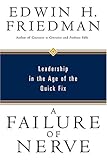
A friend of mine put me onto Edwin Friedman’s “A Failure of Nerve: Leadership in the Age of the Quick Fix”. I’ve just started it and am finding it fascinating–applying it to what I’ve read about leaders of social, political, or renewal movements (William Wilberforce, Abraham Lincoln, Martin Luther, Martin Luther King, Jr.). I’m also working up an “alumni conference” building on our current Gettysburg Leadership Conferences (ifproperlyled.org). Friedman’s work seems to define effective battlefield leadership as well (Joshua Lawrence Chamberlain, Winfield Scott Hancock, Robert E. Lee, etc). His book will no doubt help shape that alumni conference in the future.
At the heart of Friedman’s understanding of leadership is his notion of a “well-differentiated leader.”
Friedman illustrates good “self-differentiated” leadership to that present in the great Renaissance explorers, where leaders had:
- the capacity to separate oneself from surrounding emotional processes
- the capacity to obtain clarity about one’s principles and vision
- the willingness to be exposed and be vulnerable
- the persistence to face inertial resistance
- the self-regulation of emotions in the face of reactive sabotage.
Two concepts are critical in Friedman’s model: self-knowledge and self-control. Friedman attacks what he calls the failure of nerve in leaders who are “highly anxious risk-avoiders,” more concerned with good feelings than with progress–one whose life revolves around the axis of consensus. By self-differentiation, the leader maintains his/her integrity (a non-anxious self as opposed to an anxious non-self) and thus promotes “the integrity or prevents the dis-integr-ation of the system he or she is leading.”
In other places, Friedman argues that well-differentiated leader:
is not an autocrat who tells others what to do or orders them around, although any leader who defines himself or herself clearly may be perceived that way by those who are not taking responsibility for their own emotional being and destiny . . .
is someone who has clarity about his or her own life goals, and, therefore, someone who is less likely to become lost in the anxious emotional processes swirling about.
is someone who can separate while still remaining connected, and therefore can maintain a modifying, non-anxious, and sometimes challenging presence.
is someone who can manage his or her own reactivity to the automatic reactivity of others, and therefore be able to take stands at the risk of displeasing.
Reviewers of his model suggest the following (perhaps somewhat over-stated) ideas:
“The masses of people cannot or do not want to think critically, envision all the possibilities, or take risks. The masses of people prefer to leave these audacious place to their leaders. The problem occurs when we have too few leaders willing to engage authentically these actions. They have a failure of nerve….The truth is that vision exists and manifests through leaders. The masses of people simply do not have it; and, they will perish without it. When leaders have a failure of nerve, they rob us of our potential as people. They rob us of our very lives.”
Here is a good summary of Friedman’s model….worth discussing with your leadership team and using as a mirror for your own movement leadership.
Leave a Reply